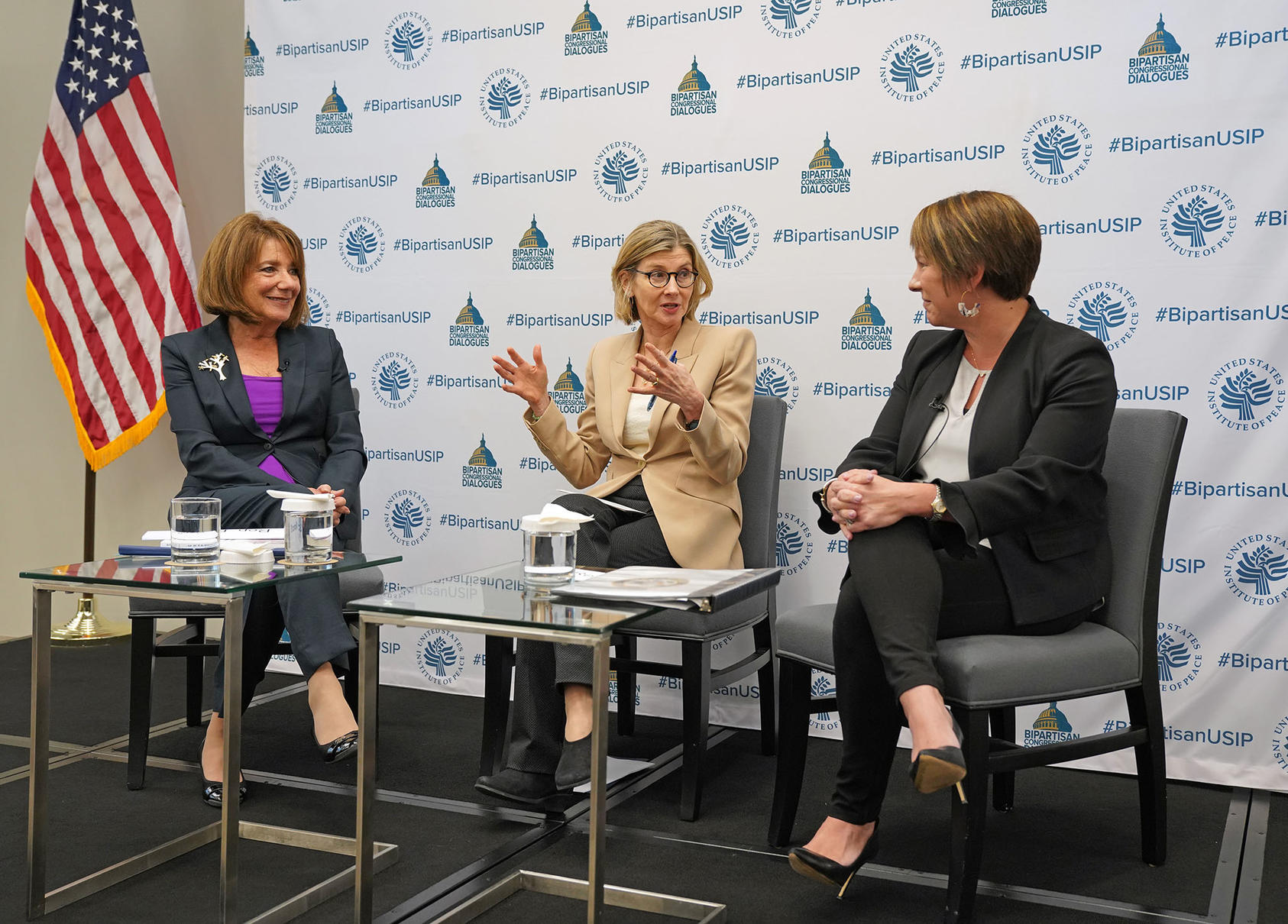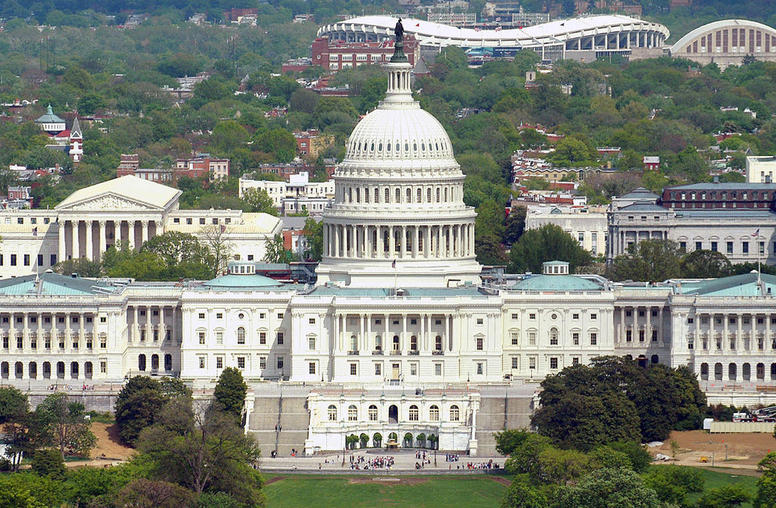To Protect Afghan Women’s Rights, U.S. Must Remain Engaged
Representatives Davis and Roby urge continued American involvement to help Afghan women achieve peace.
It’s been over a year since the U.S., led by Amb. Zalmay Khalilzad, opened talks with the Taliban aimed at ending the 18-year war. Over that year, Afghan women have demanded a seat at the negotiating table, worried that the hard-won gains made over the last two decades could be in jeopardy. Even with the peace process stalled, “it is vital that the U.S. remain engaged” to ensure that Afghan women’s rights are protected, said Rep. Martha Roby (R-AL) last week at the U.S. Institute of Peace’s latest Bipartisan Congressional Dialogue.

Roby and Rep. Susan Davis (D-CA) spoke at the Institute about the importance of women’s inclusion at the negotiating table and the urgent need for continued U.S. support for Afghan women and for Afghan democracy.
Inclusive Peace is Durable Peace
As peace talks between the U.S. and Taliban developed over the last year, many Afghan women and their supporters in the international community lamented the lack of women’s representation. “Without women’s representation in peace talks, the fragile gains of the past 18 years could be reversed or not fully addressed as part of a political settlement,” Belquis Ahmadi wrote in a commentary for USIP. President Trump’s decision to pull out of peace talks early this fall offers the opportunity to not only clarify the strategy moving forward, but also ensure that women are included.
Many Afghans also criticized the process for failing to include the Afghan government. “My hope is that the Afghan government and, of course, Afghan women are included in the dialogue” if it begins again, said Davis.
For their part, indefatigable Afghan women like Palwasha Hassan and Ayesha Aziz have shown at the local level how dialogue between women and the Taliban can work, and how to win concessions from the militant group.
Research shows that women are critical to peacebuilding: peace processes that include women in major roles more often achieve peace accords and those agreements are 35 percent more likely to last at least 15 years. “We know from experience and conviction that for peace to be sustainable it must be inclusive,” said Nancy Lindborg, USIP’s president and CEO.
Afghan Women’s Gains
During the Taliban’s draconian rule, Afghan women had almost no rights. They were forced to wear a burqa at all times and were not allowed to work. Afghan girls were only permitted to be educated up until the age of eight, and only in Quranic studies.
Since the overthrow of the Taliban, Afghan women have made impressive strides. Today, Afghan girls account for 40 percent of the country’s elementary school students and 35 percent of middle and high school students. One third of university students are women. Davis told a story about a headmaster she met on her first trip to Afghanistan and who she also met with on subsequent trips. In their last meeting, the headmaster told Davis that her main concern a few years ago was whether she would be able to get enough students. But now, the headmaster said, the biggest challenge was just finding enough desks.
Following global trends, Afghan women now compromise 36 percent of the country’s workforce. According to recent data from the Afghanistan Women Chamber of Commerce and Industry—a group that Roby and Davis highlighted during their remarks—women entrepreneurs have created 77,000 jobs for Afghans. “It was really exciting to get to see these very young women, who had joined the fight for all women in Afghanistan,” said Roby when recounting her meeting with the chamber of commerce.
In politics, women have also made important gains. They now make up nearly one-third of civil servants. In parliament, 27 percent of seats are reserved for women—in the U.S., only 21.2 percent of congressional seats are held by women. Women have been appointed as governors of Daikundi and Bamiyan provinces, and two towns have had female mayors. Afghanistan’s ambassador to the U.S., Roya Rahmani, is also a woman.
While the U.S. and the international community have provided extensive support, it is the brave and resilient women of Afghanistan that have brought changes to their society.
The congresswomen relayed other anecdotes from their visits to Afghanistan, which reinforced the tremendous progress women have made. Davis spoke of a woman she met in Qalat, a city in Zabul province, who said that she knew changes were coming to Afghan society because her son was showing true respect to his sister, something these women did not experience growing up in Afghanistan.
“We have made great strides toward improving life for Afghan women over the years, but we must keep moving the ball down the field,” Roby recently wrote in an op-ed for Alabama Today.
Bipartisanship U.S. Engagement
How can the U.S. protect these gains and promote the advancement of women’s rights? For Davis and Roby, the answer is this: the U.S. must remain engaged and ensure that all facets of Afghan society are included in talks. Women need their voices heard if their rights are not going to be compromised in a deal with the Taliban. Women’s inclusion is just as important for Afghanistan’s democracy: a 2017 Brookings Institution study found that gender equality and democracy strengthen each other.
The congresswomen have led all-female Mother’s Day trips to Afghanistan for the last eight years. These trips demonstrate the deep bipartisan support for Afghan women. By shining a spotlight on the progress Afghan women have made and the challenges they face, these bipartisan initiatives are helping build a better future for Afghan women.
As Roby and Davis spoke at USIP, a deadly attack on a mosque in eastern Nangarhar province was reported, underscoring the desperate need for peace. It’s not just the 18-year U.S. war in the country that Afghans are ready to move on from. Afghanistan has been in conflict for 40 years and its society is devastated. “The need for peace is palpable,” said Lindborg.
But, for an equitable, just, and durable peace to be achieved, women have to be included in the peace process, both congresswomen emphasized.




